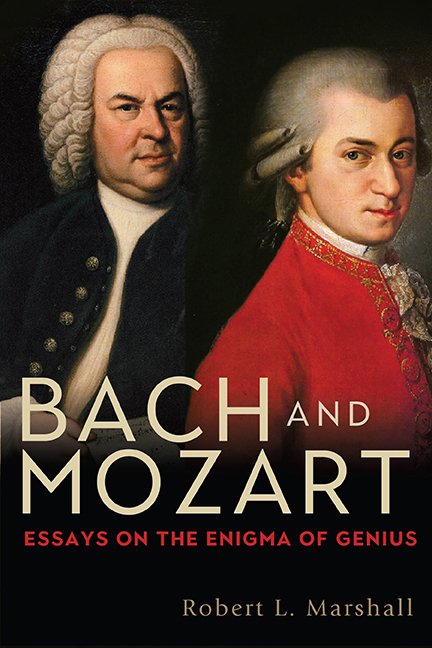Book contents
- Frontmatter
- Dedication
- Epigraph
- Contents
- List of Figures
- Preface
- List of Abbreviations
- Prologue. The Century of Bach and Mozart as a Music-Historical Epoch: A Different Argument for the Proposition
- 1 Young Man Bach: Toward a Twenty-First-Century Bach Biography
- 2 The Notebooks for Wilhelm Friedemann and Anna Magdalena Bach: Some Biographical Lessons
- 3 Bach and Luther
- 4 Redeeming the St. John Passion–and J. S. Bach
- 5 Bach's Keyboard Music
- 6 The Minimalist and Traditionalist Approaches to Performing Bach's Choral Music: Some Further Thoughts
- 7 Truth and Beauty: J. S. Bach at the Crossroads of Cultural History
- 8 Bach at Mid-Life: The Christmas Oratorio and the Search for New Paths
- 9 Bach at the Boundaries of Music History: Preliminary Reflections on the B-Minor Mass and the Late-Style Paradigm
- 10 Father and Sons: Confronting a Uniquely Daunting Paternal Legacy
- 11 Johann Christian Bach and Eros
- 12 Bach and Mozart: Styles of Musical Genius
- 13 Mozart and Amadeus
- 14 Bach and Mozart's Artistic Maturity
- 15 Mozart's Unfinished: Some Lessons of the Fragments
- Epilogue (ossia Postmortem). Had Mozart Lived Longer: Some Cautious (and Incautious) Speculations
- Notes
- Works Cited
- Index
- Miscellaneous Endmatter
- Eastman Studies in Music
2 - The Notebooks for Wilhelm Friedemann and Anna Magdalena Bach: Some Biographical Lessons
Published online by Cambridge University Press: 29 March 2020
- Frontmatter
- Dedication
- Epigraph
- Contents
- List of Figures
- Preface
- List of Abbreviations
- Prologue. The Century of Bach and Mozart as a Music-Historical Epoch: A Different Argument for the Proposition
- 1 Young Man Bach: Toward a Twenty-First-Century Bach Biography
- 2 The Notebooks for Wilhelm Friedemann and Anna Magdalena Bach: Some Biographical Lessons
- 3 Bach and Luther
- 4 Redeeming the St. John Passion–and J. S. Bach
- 5 Bach's Keyboard Music
- 6 The Minimalist and Traditionalist Approaches to Performing Bach's Choral Music: Some Further Thoughts
- 7 Truth and Beauty: J. S. Bach at the Crossroads of Cultural History
- 8 Bach at Mid-Life: The Christmas Oratorio and the Search for New Paths
- 9 Bach at the Boundaries of Music History: Preliminary Reflections on the B-Minor Mass and the Late-Style Paradigm
- 10 Father and Sons: Confronting a Uniquely Daunting Paternal Legacy
- 11 Johann Christian Bach and Eros
- 12 Bach and Mozart: Styles of Musical Genius
- 13 Mozart and Amadeus
- 14 Bach and Mozart's Artistic Maturity
- 15 Mozart's Unfinished: Some Lessons of the Fragments
- Epilogue (ossia Postmortem). Had Mozart Lived Longer: Some Cautious (and Incautious) Speculations
- Notes
- Works Cited
- Index
- Miscellaneous Endmatter
- Eastman Studies in Music
Summary
With the exception of William Shakespeare we probably know less about the private life of Johann Sebastian Bach than we do about that of any of the other supreme artistic figures of modern history. As reported in chapter 1, the extant documents bearing on his life are almost invariably “official” in character. But, although no letters from Bach to any members of his immediate family have sur-vived, one letter addressed to his childhood friend, Georg Erdmann, does touch, if ever so briefly, on his private situation. It is dated October 28, 1730. It is, typically, essentially a business letter in which Bach expresses his interest in leaving Leipzig and asks his friend to see what he could do. Quite untypically, Bach appends a concluding paragraph, much in the manner of a postscript, or at least a reluctant afterthought, in which he notes:
Now I must [Nunmehro muß doch] add a little about my domestic situation [meinem häußlichen Zustande]. I am married for the second time, my first wife having died in Cöthen. From the first marriage I have three sons and one daughter living…. From the second marriage I have one son and two daughters living…. The children of my second marriage are still small…. But they are all born musicians, and I can assure you that I can already form an ensemble both vocaliter and instrumentaliter within my family, particularly since my present wife sings a good, clear soprano [zumahln da meine itzige Frau gar einen sauberen Soprano singet], and my eldest daughter, too, joins in not badly. I shall almost transgress the bounds of courtesy if I burden Your Honor any further, and I therefore hasten to close remaining … Your Honor's most obedient and devoted servant Joh. Seb. Bach.
Ten years before Bach wrote this letter, his first wife (and cousin), Maria Barbara, had died suddenly in July 1720, after less than thirteen years of marriage, at the age of thirty-five. Less than a year and a half later, on December 3, 1721, Bach, the widowed father of four young children, married Anna Magdalena Wilcke, then twenty years old.
- Type
- Chapter
- Information
- Bach and MozartEssays on the Engima of Genius, pp. 30 - 37Publisher: Boydell & BrewerPrint publication year: 2019

